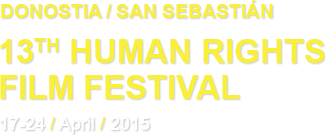- Home
- Topics
- All topics
- Rebuilding coexistence after the Civil War
Rebuilding coexistence after the Civil War
Many are those who think that the Spanish Civil War, consequence of the military coup d’état against the legitimate Republic carried out in cohorts with right-wing political and economic forces, is something of the past that we can –or must, according to others– start to forget. But we believe it continues to have important repercussion in our society: whether or not we are aware of it, many of us are marked by those extremely traumatic occurrences, whose repressive consequences stretched out over more than 4 decades and are still passed down from generation to generation today.
There is also in our society the belief that the majority of people in Gipuzkoa were nationalists and/or republications, that almost all of the population shared the same ideology and were against the uprising. In other words, that there were no Franco supporters in our region.
But historical reality would have it otherwise. In all towns and villages there were people ready to take up weapons: some in defence of the Republic and others in the attempt to overthrow it.
And after the war the “New Regime” arrived, a regime that forcibly imposed itself upon our region, and that divided people, friendships and families into “winners” and “losers”.
Villabona, a town which in times of the Civil War had an approximate population of 2,000 inhabitants, is an example of the situation in other parts of the Basque Country. In this town there were right-wing people and left-wing people. Although there was no actual battlefront in the town, there were those who fought against the military coup and those who headed for the front with the nationalist troops. And after the war, those who hadn’t lost their lives neither fled, nor were they thrown in jail; instead, they had to get back down to living together and sharing the same space, whether they were the winners or the losers.
In recent years many associations, groups and researchers have documented events during the Civil War. But we wanted to know what happened afterwards. That’s why, aware of the fact that this coexistence took place and considering today’s Villabona to be a place where these wounds are no longer open, we asked ourselves: How did the people in the street deal with it all? How did they manage to get back to living side-by-side?
We made our way to Villabona and asked the elderly what they experienced in the post-war period, what their impressions were, how they dealt with the situation, their feelings as losers –since we were unable to incorporate to the film anyone who identified themselves as “winners” or their descendants–. We also asked them to tell their story to the younger inhabitants of the town.
And when we started to hear them talk about their experiences, their fears, their doubts, the gestures they witnessed and what they heard, we felt that we had the obligation and the responsibility to convey those experiences of the past and prevent them from being forgotten, knowing that they could be useful for today’s generations, who have also had, have and will have to overcome problems of coexistence with people of ideologies totally different to their own.
And that’s how Negar franko egingo zuen aitak began, a film endeavouring to act as a new chapter bringing us closer to the events that took place: we know quite a lot about what happened in the war; now we want to know what happened afterwards.
Our medium-length film is a collective work, made with the invaluable collaboration of the people from Villabona who opened their memories and broke –some of them for the first time– their silence, of the young people who gave us their time and formulated their questions and concerns. Also of the bodies that lent us their support: the Provincial Council of Gipuzkoa, essentially, with the collaboration of the Villabona Town Council, the Aritza Kultur Elkartea and Mondagron Unibersitatea. The film lends shape –through first-hand narrations by those who suffered those events and interviews between these people and young people in the town– to how the post-war period was experienced in Villabona and how coexistence was rebuilt between “winners and losers”.
We want our work to serve, in the first place, as a tribute to all those who suffered such dramatic events, many of whom paid for it with their lives, with years in prison or exile, and whose dreams were nipped in the bud. We believe it is a duty of justice, recognition and at least a little repair.
We also want it to act as a reminder for the generations of today, so that they can learn what their fathers, mothers, grandfathers and grandmothers went through, so that they can learn from the lesson and example they have given us, knowing how to tackle life from a positive angle; despite the impositions, abuse and injustice. Which is in fact what made them the real winners.
On behalf of the whole crew, Bertha Gaztelumendi (director)









